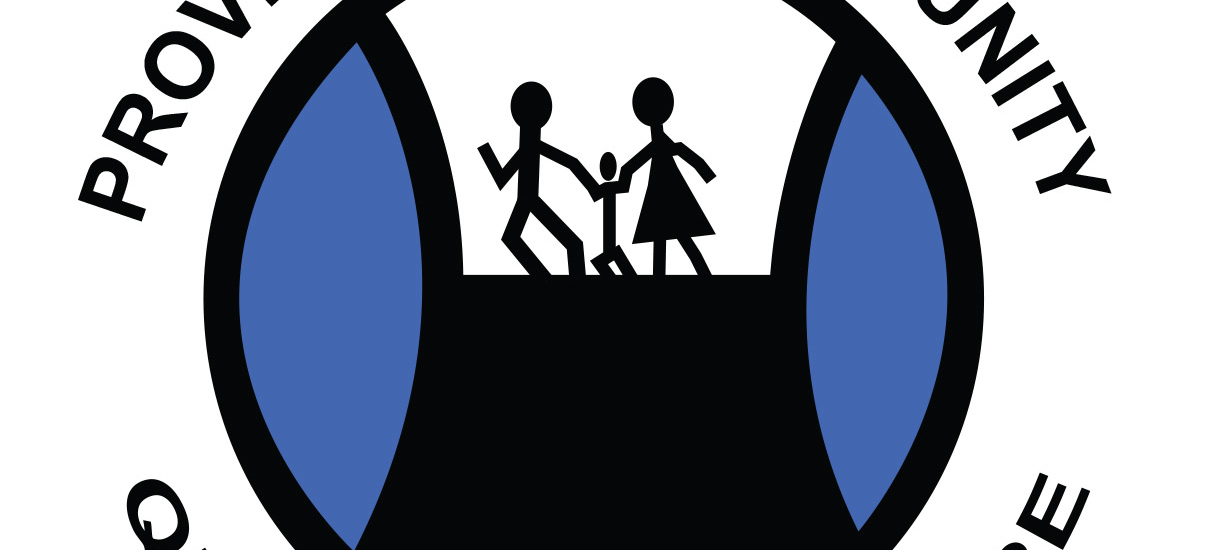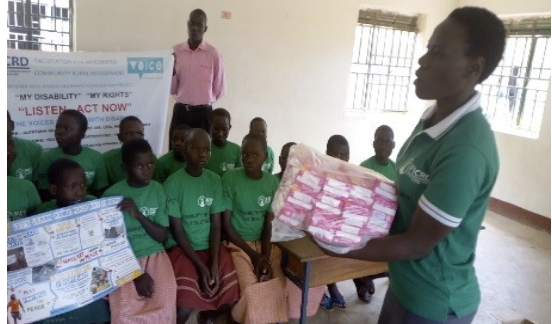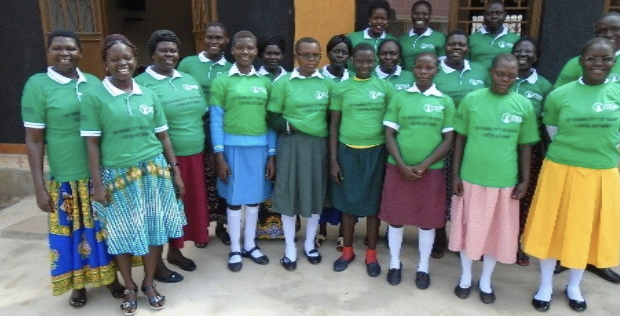Project
Lango Girls with Disabilities’ Right to Education
-
Amount Funded
25,000 EUROProject Duration
01 Nov 2018 - 30 Jun 2020 -
-
Lead organisation
Facilitation for Integrated Community Rural Development
-
Facilitation for Integrated Community Rural Development (FICRD) supports women and girls’ rights through Participatory Learning Approach (PLA), Community Empowerment and Right Based Approach on social service delivery such as educational projects, healthcare service and information, family planning and sexual and reproductive health rights.
FICRD focuses specifically on issues that affect formerly abducted children during the two-decade insurgency in Northern Uganda through gained solid experience and understanding of the ethnic differences and complexity of issues they face, especially the girl child.
FICRD also leads advocacy campaigns and by doing so secured 46,150 school drop-outs and, reduced SGBV, child protection, child marriage in schools and communities. By empowering them with various skills, they are able to fend for themselves and participate in local decision-making processes.
-
Organisation
Facilitation for Integrated Community Rural Development (FICRD) supports women and girls’ rights through Participatory Learning Approach (PLA), Community Empowerment and Right Based Approach on social service delivery such as educational projects, healthcare service and information, family planning and sexual and reproductive health rights.
FICRD focuses specifically on issues that affect formerly abducted children during the two-decade insurgency in Northern Uganda through gained solid experience and understanding of the ethnic differences and complexity of issues they face, especially the girl child.
FICRD also leads advocacy campaigns and by doing so secured 46,150 school drop-outs and, reduced SGBV, child protection, child marriage in schools and communities. By empowering them with various skills, they are able to fend for themselves and participate in local decision-making processes.
-
Project
The Lango Girls with Disability Right to Education project reduces gender disparities in the enrolment, retention, and performance of children in secondary school in Lango sub-region. The project strives for the increase rate of girls enrolment from 26% to 38% and their pass rate from 45% to 61% while aiming for Increased employment opportunities for women; improved household economies; and greater female participation in decision-making.
Girls with disability in Lango sub region are generally a marginalised group as there ia s high preference for families to send boys than girls with disability to school. It gets worse in the sense that the higher the education ladder, the higher dropout rates for girls with disability than boys.
The project utilises a range of capacity building methodologies, training, research, impact assessments, developing monitoring systems and documenting and dissemination of information. This leads to providing accessible and affordable quality SRH services and information to rural poor communities in a sustainable manner.
-
-
The Lango Girls with Disability Right to Education project reduces gender disparities in the enrolment, retention, and performance of children in secondary school in Lango sub-region. The project strives for the increase rate of girls enrolment from 26% to 38% and their pass rate from 45% to 61% while aiming for Increased employment opportunities for women; improved household economies; and greater female participation in decision-making.
Girls with disability in Lango sub region are generally a marginalised group as there ia s high preference for families to send boys than girls with disability to school. It gets worse in the sense that the higher the education ladder, the higher dropout rates for girls with disability than boys.
The project utilises a range of capacity building methodologies, training, research, impact assessments, developing monitoring systems and documenting and dissemination of information. This leads to providing accessible and affordable quality SRH services and information to rural poor communities in a sustainable manner.
-
Sexual Reproductive Health Rights Education (SRHR) and amongst Girls and its contribution towards enrolment, retention and performance of children in schools in Lango sub-region
In 1997 the Government of Uganda introduced the policy of Universal Primary Education (UPE) whose aim was to improve on school enrolment for all school going children. In 2007, another policy of Universal Secondary Education was introduced order to increase access to quality secondary education for economically vulnerable families. In 2015, Uganda being a member of United Nations adopted and committed towards achieving the 17 Sustainable Development Goals (SDG’s) one of which (goal 5) is to achieve gender equality and empower all women and girls however the country still faces gender disparities in education partly because of the existing long power imbalances but also lack of a national policy on SRHR education in schools to supplement the formal national education curriculum.
Uganda continues to faces multiple challenging demographic features which underscore the importance of SRHR policy and programmes. This includes one of the highest fertility rates in the world, high rates of teenage pregnancies as well as rising HIV/AIDS infection rates amongst adolescents. Despite a range of state and non-state interventions, there remain significant gaps and weaknesses in the SRHR landscape in Uganda.
Facilitation for Integrated Community Rural Development (FICRD) in partnership with Lira District Union of Disable Persons (LDUDP) through funding from Voice implemented a project titled ‘Lango girls with disability rights to education’ with a goal of reducing gender disparities in the enrolment, retention and performance of children in schools in Lango sub region.
With the Voice grant, FICRD carried out a baseline study in Lira district to find out the experience of rights-holders on SRHR including Menstrual Hygiene Management (MHM) in schools and the following was revealed; about half of rights-holders interviews reported missing or absent in 1-3 days of class per month, 60% of the rights-holders absent themselves from school during their menstruation, 90% of the senior woman teachers conformed that there was no provision for sanitary towels at school budgets, 60% of the rights-holders stated that they need better facilities (hardware and software aspects),96% of rights-holders stated that no pain killers are provided during menstruation cycle and 90% rights-holders & senior woman teachers said, laws and policies on abortion are unclear and are often interpreted inconsistently, making it difficult for women and the medical community to understand what is legally permitted.
In order to address the above challenges, FICRD put great emphasis on strengthening senior women teachers’ skills, capacities and knowledge regarding SRHR, Menstrual Hygiene Management (MHM), and rightsholder-friendly education methods. Senior women teachers were provided with Training of Trainers (ToT) courses to pass on SRHR and MHM knowledge and skills to their colleagues and young adolescent’s girls with disabilities, young people were empowered to become peer educators and agents of change, did (MHM) of rightsholders in schools in Lira district and established and supported eight (8) Advocacy Girls Clubs (platform for girls to show their leadership potential among themselves). In order to enhance communication among rightsholders and important adults in their lives, FICRD introduced radio programs which served as a platform for dialogue with listeners in region on key rightsholder sexual reproductive health and development issues that impact social and behavioral change.
As result of the above interventions, the following results were realized:
- 280 Rightsholders (280 female, age 13 – 21 year-old) were empowered and supported through capacity building training, health education, life skills, and MHM;
- A total of 13,448 pieces disposable sanitary pads were distributed to rightsholders in the selected schools in Lira District for management of MHM which contributed to retention of girl child in targeted schools;
- The voices of the rightsholders reached at all level of inclusiveness into the District Development Plan FY 2020/21, whereby Lira District was able to include a budget line for procurement study materials and menstrual facilities for rightsholders in various schools;
- The medical department especially Lira District Health Officers (DHO) agreed to assist FICRD to draft a study research proposal to understand fully the context of abortion in Uganda that needs to translate into laws and policy which are clear to public and can fully understand by rightsholders;
- The voice of the rightsholders reached community members including cultural and religious institutions, and overall; the project received support from general public/ community and political leaders in terms of advocacy for rightsholders inclusivity; and,
- Rights-holders were able to stay full time in school without any interference of menstrual hygiene disturbed after receiving sanitary pads from the project.

Distribution of sanitary pads to rightsholders at Ngetta Primary School. “The schools have registered reduced school dropout rates, and a reduction in teenage pregnancies, early marriages, and many other forms of sexual harassment compared to the schools where the project has not reached.
Parents have a positive attitude towards disabled girls’ education and are now responding to their duties and responsibilities. Teachers have been equipped with friendly methods of passing on information to adolescents girls with disabilities through the trainings conducted during the project.” Deputy Headmaster, St. Katherine Girls Secondary School

rightsholders with Senior Woman Teachers during the Women Council meeting at Amilton Hotel Lira Town. “Before the project, many rightsholders did not perform well in class, and would not attend classes when in their menstrual period. But with the project introduction of giving sanitary pads, they encouraged establishment of the girls changing rooms and training of peer educators, girls with disabilities no longer absent themselves, perform even better than normal girls and they have registered no school drop out.”
Senior Women Teacher; Ngetta Girls School, Lira District.





